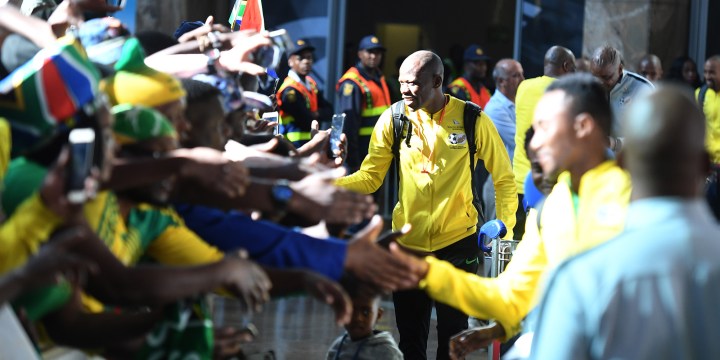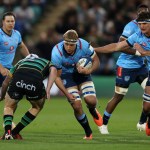AFCON ANALYSIS
Dissecting Bafana Bafana’s lingering goal drought

South Africa’s defence was rock solid at the 2019 Africa Cup of Nations, but the team was let down by lack of attacking flair. How big is the problem and how can it possibly be solved?
“How many times do you have a specific striker who you can tell: ‘Today is Tuesday, it’s the morning, we’re going to take one hour specifically to focus on scoring’?”
Forget cold Tuesday nights in Stoke, Augusto Palacios wants to know about balmy Tuesday mornings in Johannesburg. And he has good reason to.
When he replaced Julio Leal as Orlando Pirates coach in March 2012, the Peruvian inherited a misfiring team. Ezikamagebhula lost their first game under Palacios 3-0, leaving Mamelodi Sundowns as South African premier division favourites. However, the Buccaneers sprang to life at this point, picking up 25 points and scoring 18 goals in their last 11 fixtures en route to the title.
It wouldn’t be remiss to ask the same question about Monday nights at the Al Salam Stadium in Cairo. Facetious it might be, but that was the anomaly during South Africa’s 2019 Africa Cup of Nations campaign in Egypt.
The post mortems have been surprisingly few. Perhaps the euphoria of shutting down Egypt’s party was all-consuming. Maybe it’s because critique is often seen as a personal attack. Others might feel that nothing will change.
But there’s much to dissect.
Here’s a simple question: Can a team win a tournament without scoring a single goal? Don’t run an internet search for the answer. Think about it for a second. Got it? Good. It’s “yes”. It comes down to technicalities, but teams can progress through group stages by not scoring or own goals and then go on to win a title solely with penalty shootouts. We couldn’t find an instance at top-flight level where it happened, but it is not out of the realm of possibilities.
While teams don’t sit around plotting out success based on statistical anomalies, they do consider the importance of not losing — and that often takes the form of a sturdy defence.
Coaches, Stuart Baxter included, love the adage that “not losing” is as important as winning. But a “defence first” mindset can be dangerous, especially if the attack relies on countering.
It hurt South Africa at the 2019 edition of the continental showpiece with just three goals from their five fixtures.
But this problem is hardly new. The last time the country qualified for a World Cup other than by virtue of being the host nation, they struggled with the very same issue.
André Arendse, goalkeeper at the time, was quoted by Sapa as saying at a press conference that the team “owes the country goals”.
They must have got a good deal on the interest rate because that debt is still adding up. To make it to the 2002 World Cup, Bafana Bafana scored just 10 goals — the lowest out of all the qualifying contingent from the African continent. Unsurprisingly, they were bundled out of the tournament in the group stages.
It is not a simple apples vs apples comparison. Number of fixtures played by a team, the venue, the opposition and whether those fixtures are part of a qualifying campaign or a tournament all impact on goals scored in a season.
The graphic below gives an overview of Bafana Bafana’s efforts over the past decade — illustrated by goals scored in a year and average goals per game:
The picture looks grimmer when goals are plotted out per match — the bigger the circle the more goals South Africa scored in a single game:
An abundance of goals doesn’t necessarily equal success, but it sure helps. And yet, the problem isn’t just with the national team.
The 2017-18 South African season was one of the worst in terms of goals with a total of 490 goals scored in 240 fixtures. This tally improved to 543 in 2018-19, with an average of 2.26.
As already noted, goals scored does not always equal success, but how much does it matter overall?
The graphics below all illustrate the total number of goals scored in a tournament or competition, total goals scored and conceded by the team that won and most goals by a team — whether the trophy winners or not.
To keep the comparison as date-relevant as possible, data does not go back further than the past three editions of the competition in question:
Mamelodi Sundowns won the Premiership title in the past two seasons, but 89 goals in 60 games is far off the pace compared to the English Premier League. Manchester City found the back of the net 201 times in 76 games in the same period.
There’s an obvious problem. But who is to blame?
Baxter has a fair share of detractors, with South Africa’s “negative” style of football — defending to death and pouncing on the counter — often being singled out. But if the pattern for lack of scoring is present everywhere, the problem must be bigger than a national coach.
Farouk Khan, the former Kaizer Chiefs assistant coach who has presided over the highly successful Stars of Africa Football Academy as director of coaching since 2005, believes that to be the case.
“I think there’s a school of thought in the country that it doesn’t matter how you get there as long as you get there. That’s the biggest problem,” Khan told Daily Maverick.
“When you do that, you neglect the important aspects of the game like goalscoring, like good quality defending, like maintaining possession of the ball.
“The most successful models in the world now, including Manchester City and Barcelona, build on the game model. If you neglect the game model, then everything you build falls to pieces.”
Khan was withering in his assessment of South Africa’s performance at the 2019 Africa Cup of Nations, but less harsh on Baxter. The former Santos head coach doesn’t feel the current crop of players match the golden generation.
“It’s fortunate for us that Mali gave us the opportunity to go through… we had to wait. It was goal difference that made us the fourth-best third-placed team [in the group stages],” said Khan.
South Africa went on to achieve the unthinkable — knocking Egypt out of the competition. This time, Bafana got the better of the counter-attack.
Sun Tzu, the Chinese philosopher most famed for The Art of War, once noted: “Invincibility lies in the defence; the possibility of victory in the attack.” And Bafana’s defence was rock solid at the tournament, but it means little if the attacking creativity is firing blanks.
And while Khan praised the team’s efforts, he warns that small successes need to be taken in context.
“Because we are so starved of success, we overlook things, give ourselves a pat on the back and say ‘we played well’. If you look at the first half [against Nigeria], we hardly had any shots on target. How are we going to score goals if we don’t create opportunities?
“We had a very good game against Egypt, and with all due respect, they came into that game underestimating Bafana to a great extent and they were made to pay. If you look at when we scored, Egypt had pushed their entire team into offence and left a one-on-one situation. From an analytic view, you need to take those things into account.
“If you look at the next game against Nigeria, they again denied us space and time. Again, Lady Luck kissed us on the shoulder and we got a goal which came off a deflection, then conceded not long afterwards.”
As with all sport at the elite level, holistic development of players is often lacking. While soccer might be more accessible, comprehensive pathways to excellence are sorely lacking.
“It’s not about Stuart Baxter; it’s not about the coaches. It’s more about development structures in this country — most play games without a proper goal. They grow up to a point where they get to the proper game and facilities don’t really cater to the majority of these kids. Those that have the facilities have had very little specific positional work done on scoring.”
Even some of the best players in the country haven’t gone through the cycle of development, according to Khan. He lists Steven Pienaar and Luther Singh as two examples of holistic development, but believes improving physical education at school is critical to future success.
According to the 59-year-old, children in South Africa are generally taught skills such as how to fall, turn and jump far too late in their school careers.
On the surface, this seems very far removed from matters under the jurisdiction of those who run football in South Africa. But Khan argues that the lack of cohesion between football administrators, clubs, development coaches and schools has held South African soccer back.
“We need to all put our egos at home and we need to all come to a table and ask ‘what do we need to do?’ We need to get school sports going — we need physical education. We need to get clubs to employ the right people to do their development — we don’t want to take shortcuts,” he proposed.
The development process — or lack thereof — of specialised youth coaches is one area in which Khan said the South African Football Association has attempted to take a short cut.
“The current coaches that we have in the country — the coaching courses which they are doing don’t prepare them for youth development. SAFA have what you call ‘Grassroots’ — it’s a two-week programme. You can’t develop a youth coach in two weeks.”
These courses are reasonably comparable to entry-level options offered by other sports. World Rugby’s Level 1 and Level 2 accreditations can be completed in eight and 30 hours respectively. That’s all part of the idea to make coaching more accessible when starting out, but it’s not so simple.
Robin Petersen, the former CEO of both SAFA itself and the organisation’s development agency, conceded in an interview with Daily Maverick that more needed to be done in order to develop youth coaches. However, he explained that a general shortage of coaches across South Africa had forced the organisation to fast-track as many as possible through the system.
“It’s because of the size of football — because there are 243 local football associations. If you want to train 30 coaches for each local football association, that’s already (close to) 10,000 coaches and that’s only scratching the surface of what’s needed,” said Petersen.
“It’s not a simple matter. If you take training 10,000 coaches. Let’s say there are 350 courses that are being run multiplied by R60,000 to run a course, you’re talking a lot of money. At SAFA Development Agency, we raised lots and lots of money and the current Imanati Programme is also running lots and lots of money to train coaches. However, the need will always outstrip the capacity.
“One of the things that SAFA is doing is exploring converting at least the theoretical part into an online course and that would help because we could then reduce the number of face-to-face days needed for a coaching qualification. That would reduce the cost of delivery and make it accessible to lots more people.
“But it comes with a cost as people don’t all have access to computers and internet and so on. Whichever way you go, there are going to be challenges.”
It’s a tough task, but there are shining examples of experienced mentors who have devoted themselves to youth development. Khan is one, while Augusto Palacios is another. A treble-winning senior coach at Orlando Pirates in 2012, Palacios now heads the Buccaneers’ youth development structures. This is where his passion lies, but it’s not easy.
“We can [develop star players] here, but remember: There are a lot of components. For example, how many times do our players do individual training?” Palacios told Daily Maverick.
“If we don’t prepare our players from an earlier age, we cannot win. Development is like school. Primary school prepares you to go to high school, correct? Football is the same. When you arrive at U15, you’re finished at primary school.”
Palacios echoed Khan’s claim that many South African players are not given enough technical training at a young age. Although he does not believe in instant gratification, the 67-year-old does have an incredible success story on his CV which might carry clues on how to get a misfiring attack working in South Africa.
Palacios says the key to his success centred on learning through repetition.
“After training on Sundays, we did a lot of specific scoring things. I focused a lot on finishing and scoring in my side. Football is not coached in two hours for me, but in the whole day. Players need to watch videos and understand their mistakes.”
Given Palacios’ success using highly specialised training methods at Orlando Pirates, it is hardly surprising that they have finishing coach Stephane Adam on their books today. However, one season into their working relationship, Pirates’ goalscoring problems have not been fixed entirely. The Buccaneers scored 44 goals in the 2018/19 league season compared to 41 during the previous campaign, finishing second to Sundowns two years running.
Until South African youth football reaches its full potential, it seems even the most specialised of senior coaches will struggle to get the best out of their strikers.
“We have good players in the country, but I still believe we need to give more opportunities to our young players. We must not think that 21- or 22-year-old players are young. No! A player is young at 16 or 17,” Palacios explained.
He also stressed the importance for South African clubs and national teams alike of developing unique identities and implementing them from youth level up.
“You have players from Cape Town coming to Johannesburg. [The moves don’t work out and] they go back to Cape Town. For me, when you develop players, you mould to the culture of the club, to the style of players and to the history of the club. It’s very important. The identity of football is very important,” Palacios said.
“When you scout players, you scout according to the characteristics of football you play. If I want to play on the ground, I cannot sign a player who does not have the technique.
“It’s the same with Bafana Bafana — what is our identity?”
According to Petersen, SAFA has decided on a football philosophy which they intend to follow across all levels of the game. Implementation, however, is a challenge.
“It’s meant to be part of the core curriculum. You can have the document, but you’ve still got to train coaches to deliver on that philosophy. Currently, obviously, our elite youth programmes are where the clubs are. Clubs in the Premiership, their academies such as they are, those clubs would have their own philosophies,” said Petersen.
“For instance, [National First Division club] Ajax have got a fantastic academy programme, but Ajax’s academy will run on an Ajax philosophy and they’re very insistent on that. That Ajax philosophy might not be the national football philosophy.”
Petersen revealed that SAFA’s goal under the guidance of technical director Neil Tovey is to implement a football philosophy which combines traditional South African flair with the ability to put the ball in the back of the net. The former SAFA CEO believes finding a balance is crucial to addressing the goalscoring problem.
“My experience of why we don’t finish is that it has to do with the culture of street football that we have that forms the basis of so much. If you think about it, if you’re playing football on a township field or the streets in the townships, there generally aren’t goals and there certainly aren’t nets,” Petersen said.
“If you do shoot, you’re likely to lose the ball or puncture it. The skills that are developed and celebrated are the showboating midfield keeping possession (sic), doing tricks, that kind of thing. That’s what’s celebrated much more than scoring a goal. I think that’s a large part of where our culture of not finishing comes from — it comes from the conditions in which a lot of our football is played as youngsters in the streets of the townships.
“We’re definitely on the right track [towards addressing South Africa’s systemic scoring problems], but it’s a long way to go still.”
As much as South Africa faces a unique set of challenges caused by economic inequality, Bafana Bafana are in a similar position in pure football terms to where England were seven years ago. After the surprise appointment of Roy Hodgson as national team manager, the Three Lions enjoyed a respectable run to the Euro 2012 quarter-finals. But their style of play was unpalatable to some.
Hodgson led England until their abysmal Euro 2016 campaign ended with a last 16 loss to Iceland. The following year, England won the World Cup at U20 level and the U19 European Championship. In 2018, Gareth Southgate took the first team to the World Cup semi-finals. A footballing powerhouse was reborn.
Reports claim the sudden success came largely as a result of the FA introducing consistency in terms of playing style for England teams across all age groups.
South Africa’s own U20 side has shown signs of promise in recent years, even finishing third at the 2019 U20 Africa Cup of Nations. Notable in that feat? Lack of goals. They scored just two in five games and then flunked out in group stages at the U20 World Cup.
Like Amajita, Bafana Bafana have also taken a step forward in terms of results, making the Afcon quarter-finals for the first time since 2013. Stuart Baxter’s side conceded just six goals in 11 matches during qualifying and the finals in Egypt combined.
As with all statistics in sport, there is always a caveat: Algeria won the 2019 Africa Cup of Nations with the best defence and the best scoring record. It’s a bit of an anomaly for trophy-winning sides.
Equally, just because the number of goals scored in a competition is high, it doesn’t mean the team that scores the most will win the trophy. The graphic below illustrates the percentage of overall goals the winning team scored — in a variety of competitions over the past three seasons.
And yet, in the final against Senegal, it took a fluke goal for the Desert Foxes to secure the title.
The Teranga Lions dominated shots taken, on target, off-target and shots blocked — 12-1 overall. They had the bulk of the possession — more than 62%, they passed better, won more aerial duels and wove together more passages of play.
But much like Bafana Bafana against Egypt, sometimes you need a bit of luck to get you over the line. Perhaps, though, it’s not luck at all, but rather the preparation for all eventualities that makes the difference. DM



















 Become an Insider
Become an Insider